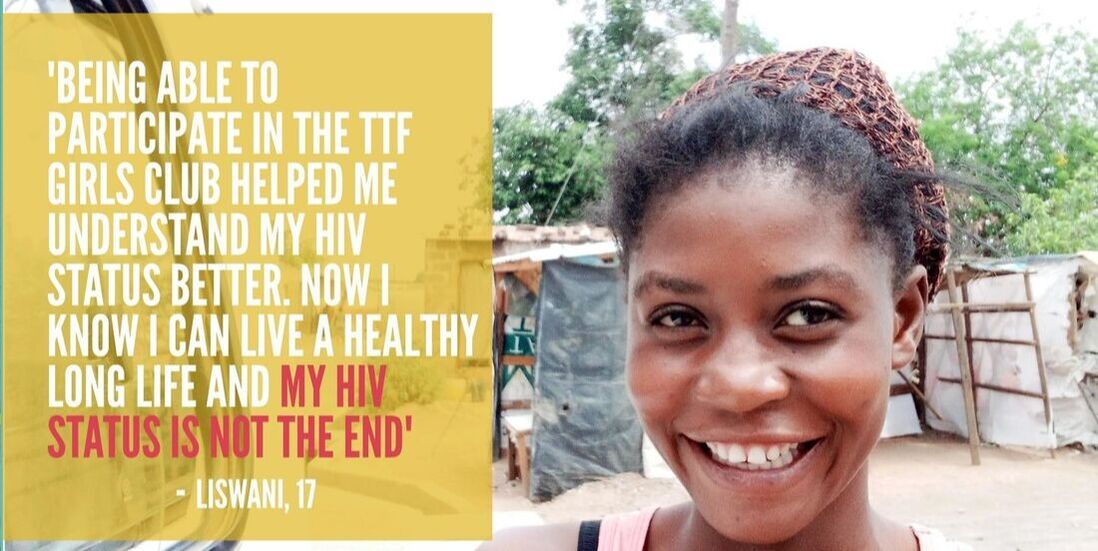 Liswani is 17 years old and discovered she was living with HIV in 2019 through a routine TTF community testing day. When she learned about her status, she felt alone and did not have anyone to talk to. Liswani would often come to the clinic, always reserved, without saying much. One day she was invited by the TTF counselors to attend the TTF Girls Club, with the intention of help provide her with a support network of peers living with HIV. It was here that this quiet, shy girl revealed her story: Liswani lived with her stepfather and mother. Only Liswani’s mother knew her status, but one day her stepfather found a bag with her medication and her mother was forced to tell him Liswani had tested positive for HIV. When this occurred everything changed for Liswani. She explained that often her stepfather would throw away any food she prepared for him or even break plates if he saw her using them. She suffered daily stigma and discrimination from her stepfather, and he even stopped paying for her school fees forcing her to drop out of school. With the constant bullying and negativity at home she even thought of committing suicide. Slowly, with the support of the TTF Girls Club, Liswani began to find solace in her newfound friends and was able to draw strength from their individual experiences of discrimination and how they dealt with it. By opening up to her peers this young girl has blossomed to being a strong confident young woman. By learning about HIV and acceptance at TTF she has been able to speak to her family about HIV, breaking down barriers and improving her relationship with both her parents. Liswani’s mother was invited to attend a TTF caregiver’s workshop, where she learned about HIV, how to better support her daughter, and how to speak to her husband about HIV transmission, breaking down the misinformation and stigma. Today, Liswani is virally suppressed and is active in many youth programs offered at TTF. Liswani hopes she will one day be able to go back to school. She wants to be a nurse and help other girls like her. Your donation allows us to support girls like Liswani. Please consider supporting us to continue running the Girls Club:
0 Comments
Blessings, 14, is shy. I can see she has a lot of potential if she was given the right opportunities in life. But she doesn't make friends easily. She stigmatizes herself and withdraws, denying herself the support network she desperately needs to shine. I sit with her and talk to her about living with HIV. With support from TTF her mum told her she is HIV+. To help her understand what this means Blessings is attending a children's support group. She is learning about HIV and how to live healthily. She is clever and explains brilliantly about the things she has learned. She says she feels better having made friends at the support group but I know she often sits to the side, quietly taking in the scenes around her, too shy to interact with her peers. I ask Blessings how she feels about living with HIV. She tells me she feels bad. She says she hears people saying things about people living with HIV that make her feel bad about herself. Even with HIV education she continues to self stigmatize. But it doesn’t have to be this way for Blessings. Our staff take their time to get to know her needs beyond HIV treatment, they will help her find a way to feel good about herself. We make the TTF clinic a place where confidence and independence can be gained. But this doesn't happen overnight and we cant do it alone. More than ever we need your help to change lives.This year we are aiming to raise $20,000 to support the Tiny Tim & Friends Clinic and we need your support. I urge you to give a child like Blessings a gift this Christmas by donating to Tiny Tim & Friends. Your support ensures Blessings, and many other children like her can get the right treatment, care and counseling they need to thrive in life. Thank you Jac Connell, Director, Tiny Tim & Friends Zambia. The staff and board at Tiny Tim & Friends are committed to continuing our work and developing programs to support even more HIV+ children and adolescents live healthy, positive lives. Our donors and supporters have enabled TTF to pilot many new interventions over the years which have allowed us to change the lives of thousands of HIV+ individuals. WE CONTINUE TO NEED YOUR SUPPORT IN CHANGING LIVES. Adolescent girls are twice as likely to get infected with HIV as their male counterparts. And many adolescents do not feel empowered to access contraception, do not feel empowered to ask their partner to wear use condoms, or do not know where to access contraception from in order to protect themselves from infection. When some of our adolescent peer mentors came to us recently to suggest setting up youth friendly services at the TTF Clinic, we were excited to hear about their ideas. Our aim is to support them to develop a youth focused project which could not only help us in retaining our existing adolescent patients into treatment but in identifying new patients to reach out to and providing a safe space for young people to come and access information and services. IT COSTS LESS THAN $7,000 TO SET UP AND RUN OUR YOUTH FRIENDLY SERVICE FOR 6 MONTHS.The purpose of the youth friendly center would be to provide youth led HIV testing, counselling, sexual reproductive health information, access to condoms and referral services for those in need of HIV treatment, or other health and counselling services. We would also run community based outreach services, led by our teen mentors and youth counselors, with the purpose of encouraging HIV testing in the community around the TTF Clinic and to encourage individuals to come to the clinic for testing and information services. Finally the youth groups want to establish chess clubs, sports teams and activity groups to provide a much needed distraction from some of the vices, such as alcohol and drug abuse, which are too easily accessible to the vulnerable populations we work with. We are more than confident that with the right funding, and guidance from the TTF management and social work teams our peer mentors can set up services which supports adolescents in:
BUT WE NEED YOUR SUPPORT. IT WOULD COST US LESS THAN $7,000 TO ESTABLISH AND RUN OUR YOUTH FRIENDLY CENTER FOR 6 MONTHS, DURING WHICH TIME THE YOUTH WOULD LOOK TO UNDERTAKE FUNDRAISING ACTIVITIES OF THEIR OWN IN LUSAKA TO SUPPORT THEIR CONTINUED OPERATIONS. PLEASE CONSIDER SUPPORTING OUR WORK BY DONATING TO TTF TODAY!(Please state the purpose of your donation on the donation page) In 2016 TTF ran a Crowd Funding campaign through Caring Crowd to support 50 of the most malnourished patients at Tiny Tim & Friends. Thanks to the support of 79 donors who came together to support our cause, and to Johnson & Johnson who matched every donation, we were successful in reaching our goal. So in early 2017 we spent time undertaking home visits, to understand the needs of our patients, and identifying those most in need of nutritional support. Finding 25 children and adolescents who were eligible was sadly not difficult. Many of the children were so malnourished and underweight they were suffering with opportunistic infections and alongside nutritional support also required supervised palliative care to help them get well. Supporting families with nutritional food packages is easy. But ensuring the children we are supporting are gaining weight and getting healthy is much more complex, involving regular counselling, home assessments, medical interventions and sometimes palliative care.
Thanks to the support of 79 donors through CaringCrowd and from the hard work of our counsellors all of the children gained weight, including one child who gained a massive 9kgs. Stay posted for further stories of each of these children but in the meantime we hope you enjoy seeing the pictures of just a few of the children you have changed the lives of. PANJI IS DESPARATE TO FINISH SCHOOL BUT HAS NOT BEEN ABLE TO ATTEND FOR OVER 6 MONTHS DUE TO POOR HEALTH Sadly, sometimes patients come to TTF and from their appearance you immediately you know there is a major health problem. This was the case for 19 year old Panji when he was brought to the TTF Clinic earlier this year. Panji is 1.73m (5ft 8) and weighs only 42Kgs (92lbs). He is significantly malnourished and currently undergoing tests to see if he is suffering from Tuberculosis. His malnutrition, alongside HIV and suspected TB puts his health at significant risk, and without boosting his immune system just a small infection could prove fatal. Panji's parents died when he was just a child and he now lives in a one room house with 6 other people (his sister (pictured below), brother in law, and four nieces and nephews), sharing a pit latrine with 20 other people. Whilst food in the home is provided by Panji's brother in law, there isn't enough to support Panji in his current state and he is in desperate need of nutritional support. He needs your help to ensure he can go on to finish his education and lead a healthy, successful life. "I WANT TO FINISH SCHOOL SO I CAN BECOME A DOCTOR AND HELP OTHERS"Panji, was identified in the community by one of our teen mentors. He had previously been tested for HIV but wasn't yet ready to accept his status. Our staff have been working closely with him to provide him with medical advice and emotional counselling to prepare him to start on medication. But because of his late access to treatment he is incredibly sick and because of his poor health, he has been unable to attend school for the past 6 months. He desperately wants to complete his education so he can make something of his life and help others.
With the right medical, social and nutritional support Panji can go onto lead a healthy life, but we need your donations to support him and 49 other children and adolescents like him to reach our crowdfunding goal. So please consider pledging today and changing Panjis life around for the better! As Tiny Tim & Friends grows in terms of patients, and the number activities we undertake to provide additional layers of support to those patients, we must also grow our support networks around the world. In Lusaka our community volunteers provide an essential part of our work in: helping us access individuals who would have been previously unknown to us; in allowing us to provide home based support to our patients across Lusaka; and in ensuring we can provide follow ups to everyone we test as HIV+ in order to ensure they are getting the right medical care and treatment they need to lead a healthy life. We specifically work with HIV+ women in the community to help support our work and to provide HIV awareness and sensitisation. Their personal insight into living with HIV and their understanding of the issues the communities are facing enables us to have a much greater impact on the lives of the children, adolescents and pregnant women we work everyday to support. One of our community volunteers is Margaret, 45, who after her diagnosis of being HIV+ decided she wanted to help others: “ I tested as HIV+ in 2004, I was scared at the time because I had three children and was worried they would also be HIV+. I knew a little bit about HIV but mainly that it could kill you and knew nothing about being able to live a healthy life. I got all of my children tested and they were all negative. I was put on ARV’s and started to learn more about HIV. After I understood more I decided I wanted to help other people who were HIV+ and help others to understand more about HIV. So in 2006 I started volunteering at George Clinic doing filing, helping with follow ups and monitoring the growth of malnourished children. Then one day a lady came to the clinic and told me about Tiny Tim & Friends and asked if I would be interested in volunteering with them to help identify HIV+ children and that is how I came to work with TTF.
My favourite part of working with TTF is when you find someone in the community, get them tested and they get enrolled into the clinic because I know then that they will have a better chance in life to be healthy. There are a lot of problems in the community which I see which can lead to increased HIV transmission or ill health for people living with HIV. There is no employment, people do peacemeal work selling vegetables, cleaning, collecting bottles but nothing consistent. The best job for a community member is a security guard but you need to be healthy so if you are HIV+ and not on treatment you can get sick a lot and then end up losing your job. Because people have little money to survive some people resort to crime, stealing from peoples homes. Alcoholism and substance abuse is an issue, especially for young men and women. They have nothing else to do so soon turn to substances for entertainment. This can lead to promiscuity or sexual assault for women. Additionally a lot of young women and children are assaulted by family members. People are afraid to report it to the police for fear of judgement that they have been out drinking or that their family member (who could be a wage provider) will go to prison and their family will suffer more. Its also not easy for young women to get condoms, vendors wont sell to them and they don’t feel empowered to ask a man to wear a condom in case they are accused of being promiscuous. I see a lot of teenage pregnancies because the girls are vulnerable. There are a lot of orphans in the community so they are also left vulnerable. The teenagers are the ones who need education the most, to understand the importance of safe sex. And for young girls to be empowered and feel confident to insist on safe sex. In Zambian culture that is a difficult thing to overcome. There is also a lot of education needed on the dangers of stopping medication once you have started it. And the importance of talking to your health care provider if you are experiencing side effects. A lot of the time in the community if someone is HIV+ and gets sick people can stop caring for them as they expect them to die but that isn't the case any more with medicine. People need educated around this. I try and talk to 2-3 people every day, I tell them I am HIV+ and they are surprised as I am healthy – they have a lot of questions about medication and side effects. A lot of people are also afraid of getting tested but when I tell them I am HIV+ they feel a lot more comfortable, and a lot less fearful that it means an early death. I want to go back to school so I can continue to work with TTF and do even more work with them to support HIV+ individuals in the community – to help children and families to be less fearful and ashamed and to be rid of the stigma that exists around HIV so that people can lead more open lives and transmission is reduced. Since I found out I was HIV+ I have also had another child who is very healthy so I know it is possible to lead a healthy normal life with the right treatment and support, like TTF provide. I want others to have the same opportunities I have. “
Noah talked about some of the challenges and successes he and his team experiences over this grueling 2 weeks. "KNOWING THAT WE CAN SAVE A CHILD'S LIFE |
| What is it like in Chibolya? Chibolya compound originated from the migration of people from different places around Zambia in search of greener pastures, but basically ended up being a hiding place for armed robbers, drug dealers and prostitutes. There are basically no facilities there, especially health, education and police presence. The houses have no order and most don't have house numbers. This means finding your way around and finding people can be really difficult. When TTF do outreaches do you only focus on children? No, not at all, we test entire families and individuals who request it. |
| Why do you think that it’s important to recognise National youth day and what will you be doing on the day? It is an important day to recognise because in a Zambian the youth are the majority and form the highest part of the population. Whatever is going on in employment, volunteering, bus drivers, they are all young people – youth day gives people an opportunity to reflect on their lives, and what they want to do. I will be sharing my day with the senior citizens, 65 and above – and try to find out about life, how life was, before independence compared how life is now. I want to know how they used to treat each other, to talk about issues which are happening with young people today and find out from them how it was and how we can move forward. | In Zambia females aged 14-29, orphans and vulnerable children are the most at risk of contracting HIV and. An estimated 80,000 – 100,000 HIV+ adolescents (older than 14) are not currently on treatment. What more do you think TTF can be doing to help address this issue? Most young people are on social media – TTF need to work on a social media and social work side, having a Q&A page where individuals can post questions. We need to make sure young people are given the opportunity to understand the organisation and what we can offer. This could be done through advertising our clinic and services. TTF also need to continue our outreaches and focus on young people and adolescents. Young people will then understand what we stand for and HIV. We also need to strengthen our women groups, coming up with a system of referrals for young people. By doing these three things we are catching people on Facebook, in the community and in an urban setting. |
archives
February 2024
November 2023
January 2021
December 2020
October 2019
November 2018
April 2018
December 2017
November 2017
October 2017
September 2017
June 2017
December 2016
November 2016
October 2016
May 2016
March 2016
December 2015
November 2015
October 2015
September 2015
July 2015
May 2015
March 2015
January 2015
December 2014
Categories
All
Birth
Children
Community Outreach
Counselling
Death
Donations
Dr Tim Meade
Fundraising
Grief
HIV
HIV Negative Children
HIV Testing
Loss
Lusaka
Nutrition
PMTCT
Tiny Tim & Friends
TTF Clinic
TTF Partnerships
TTF Women's Groups
Volunteer
Women's Rights
Young People And Adolescents
Zambia

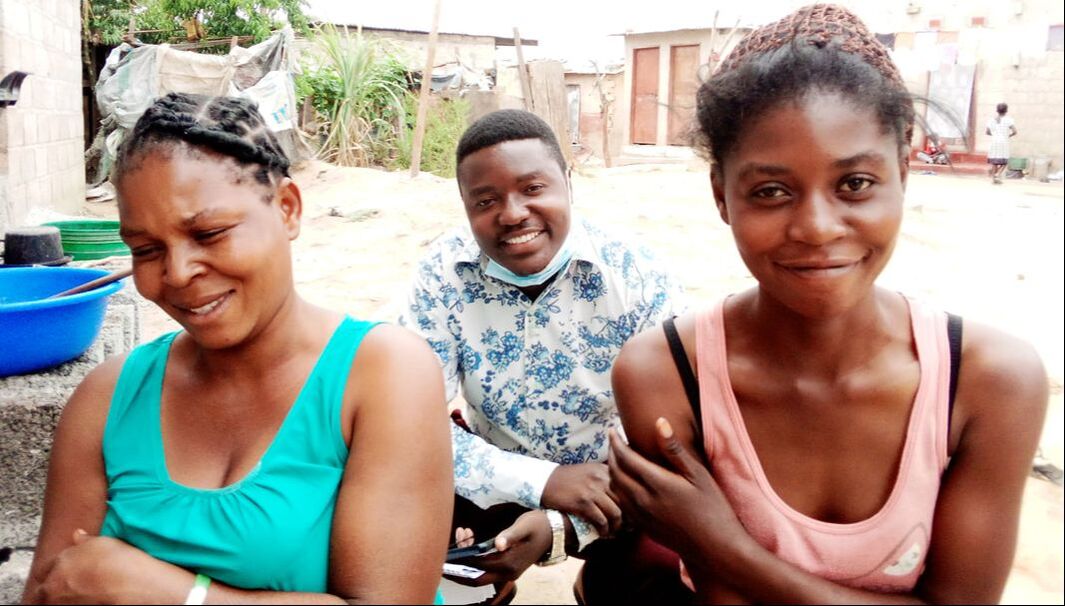
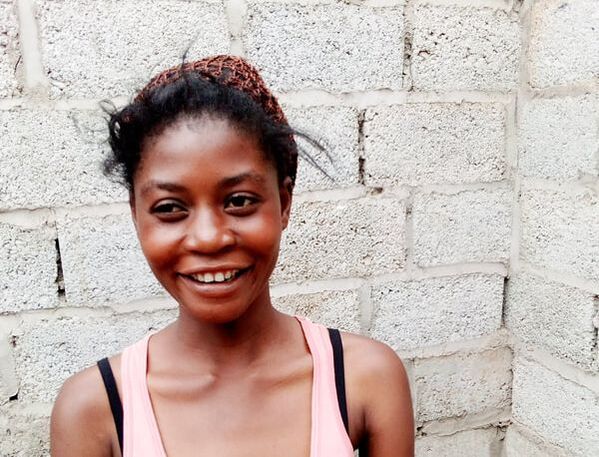



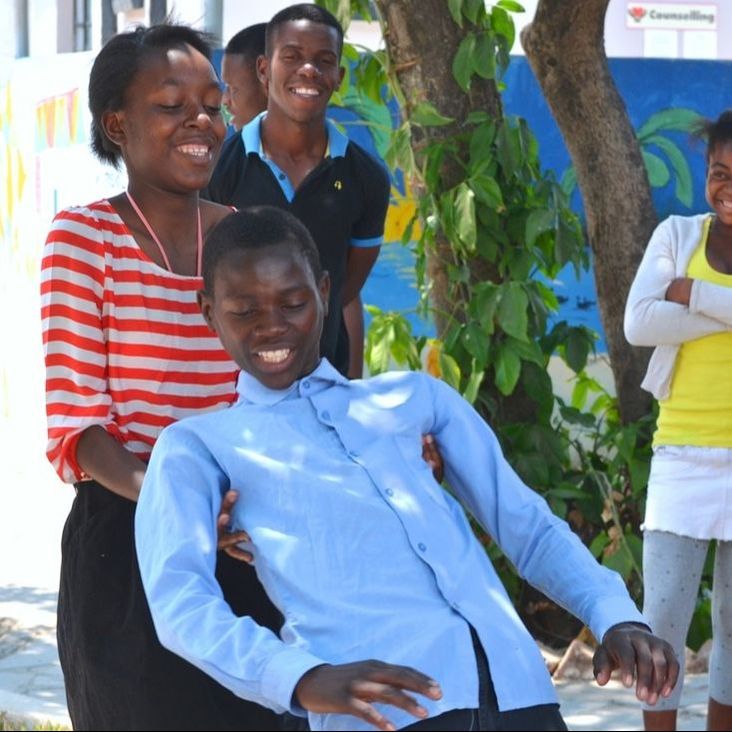
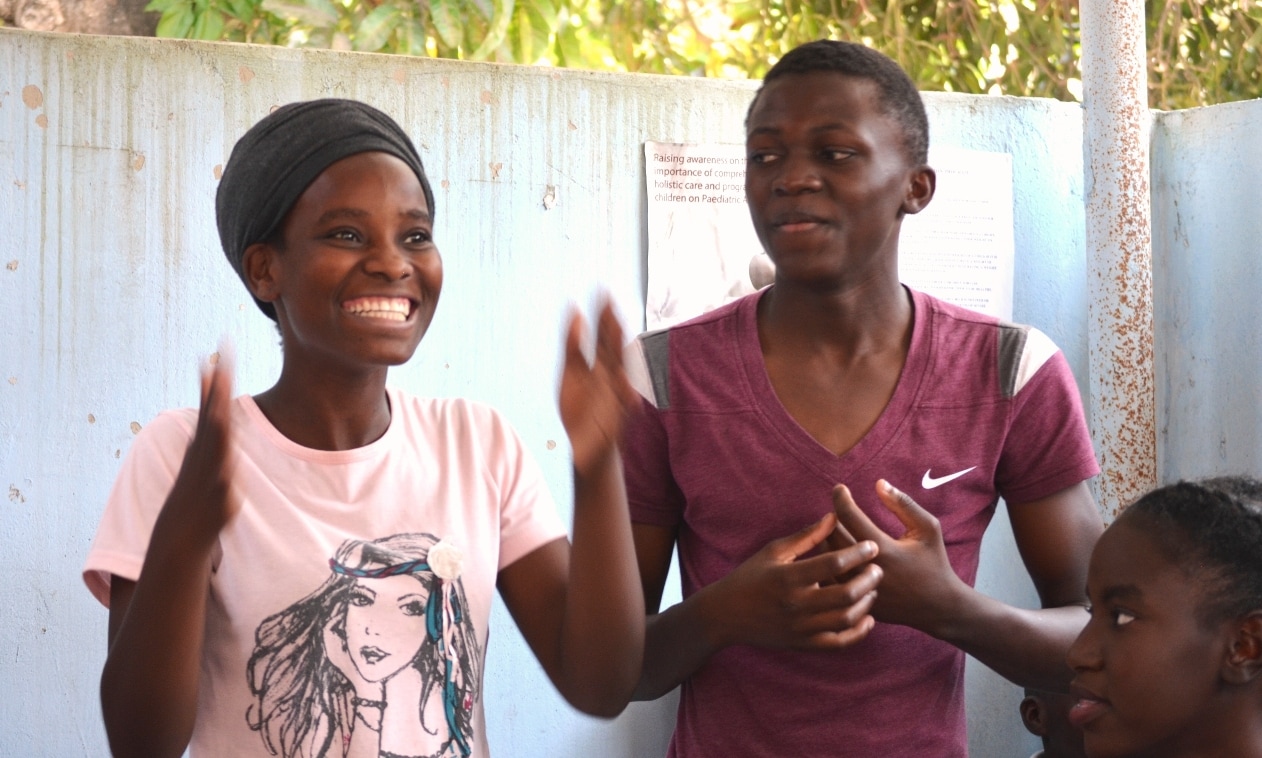
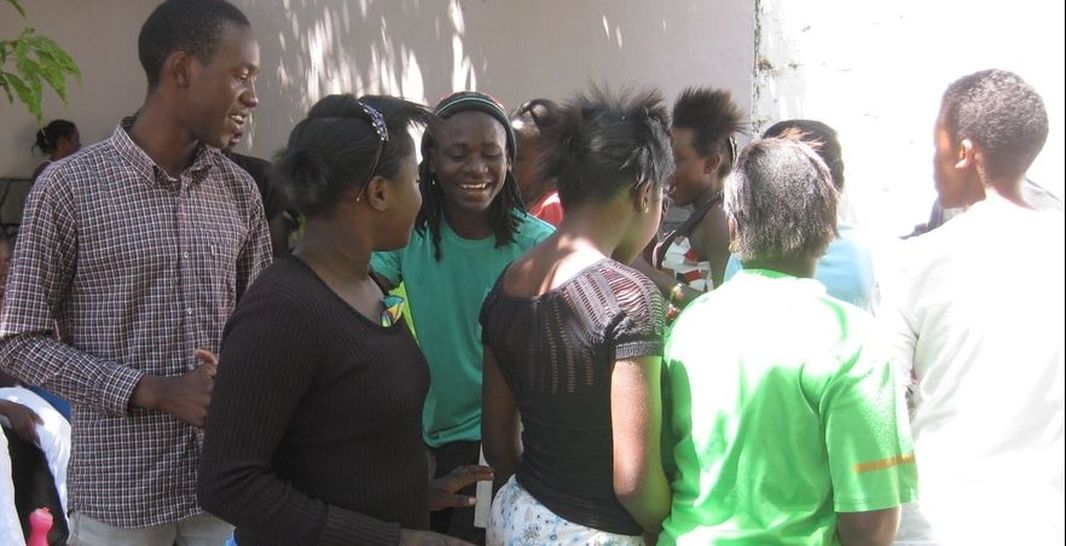
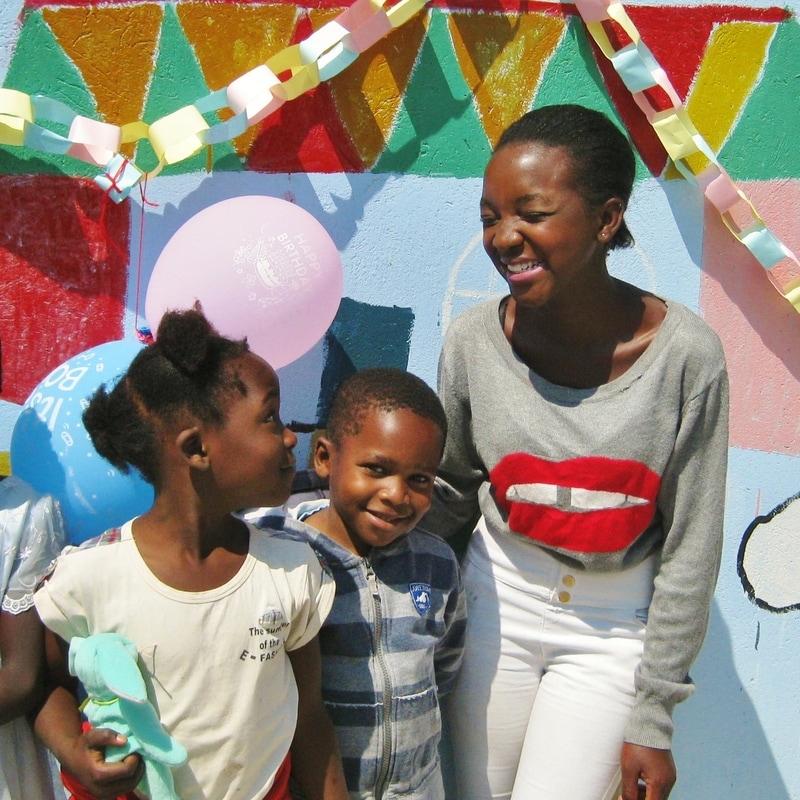
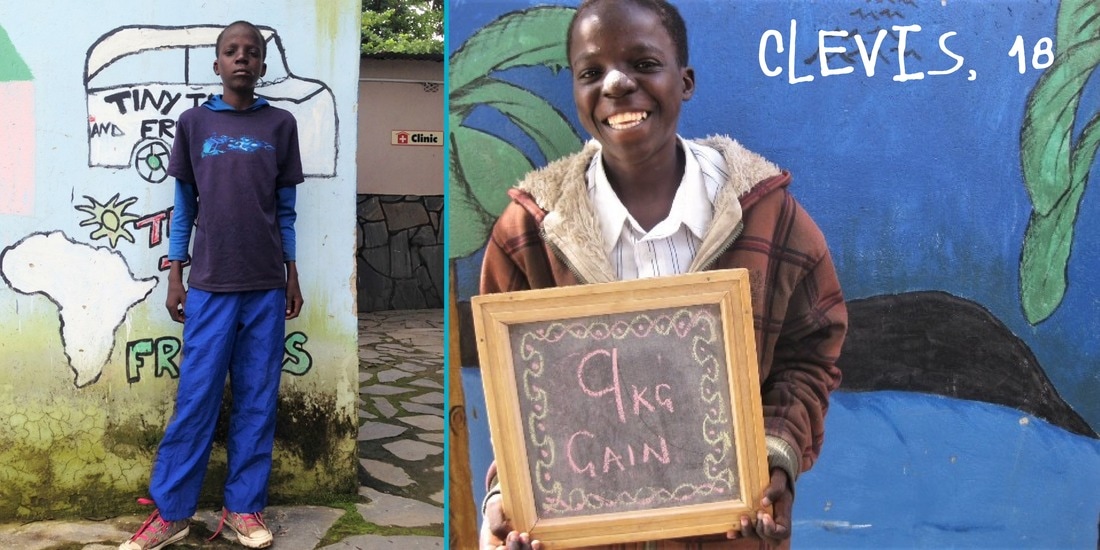

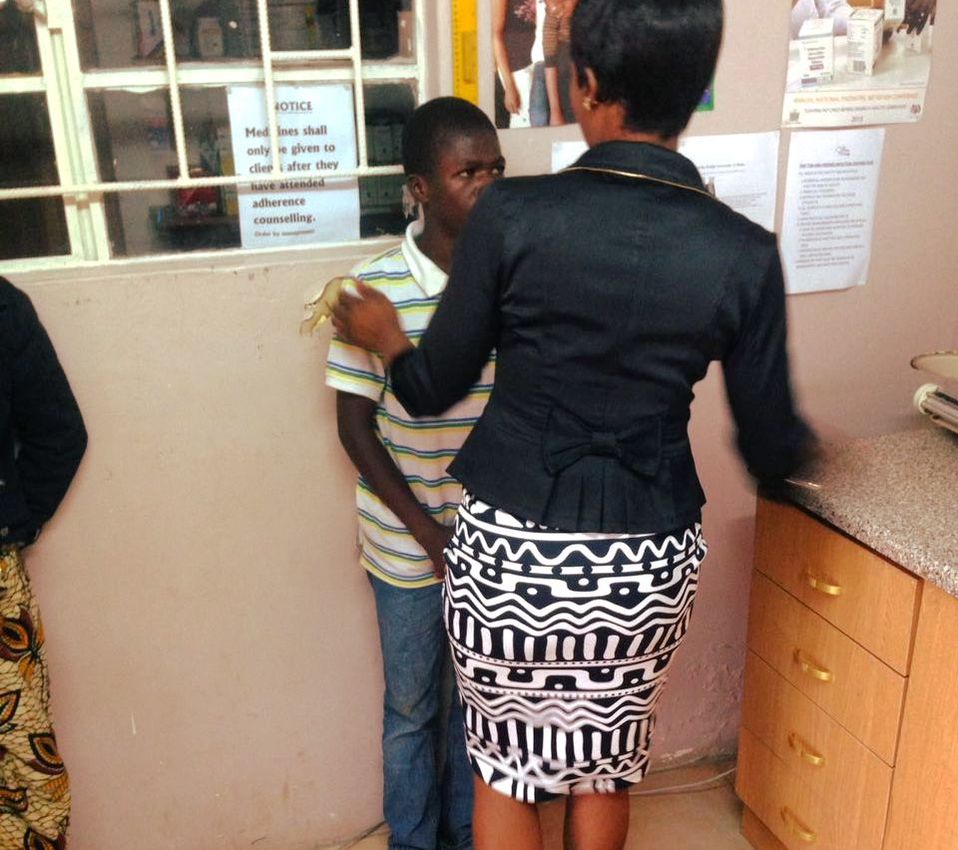
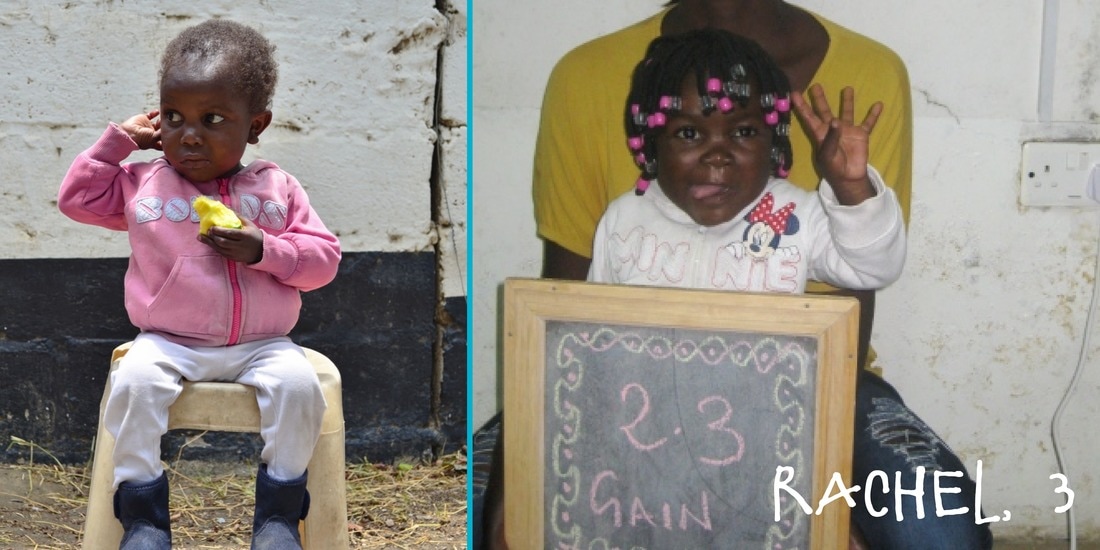
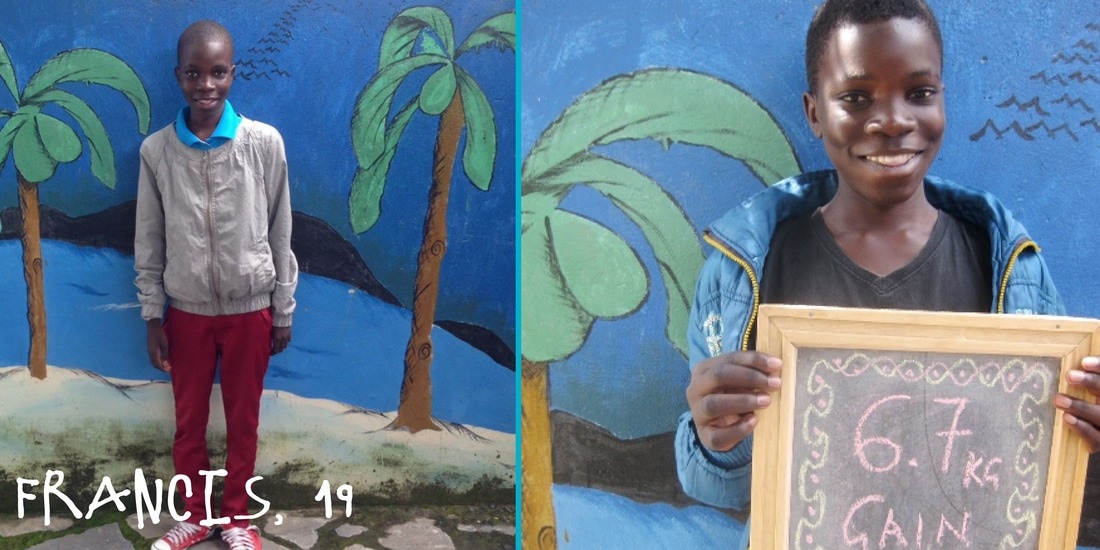

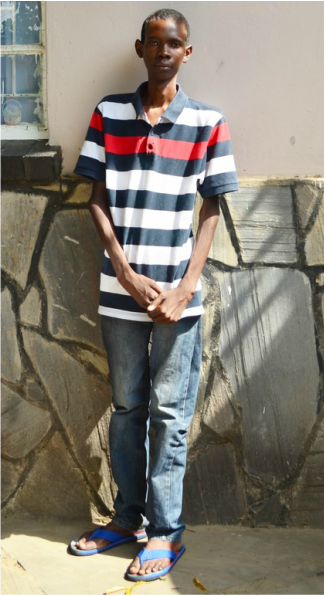
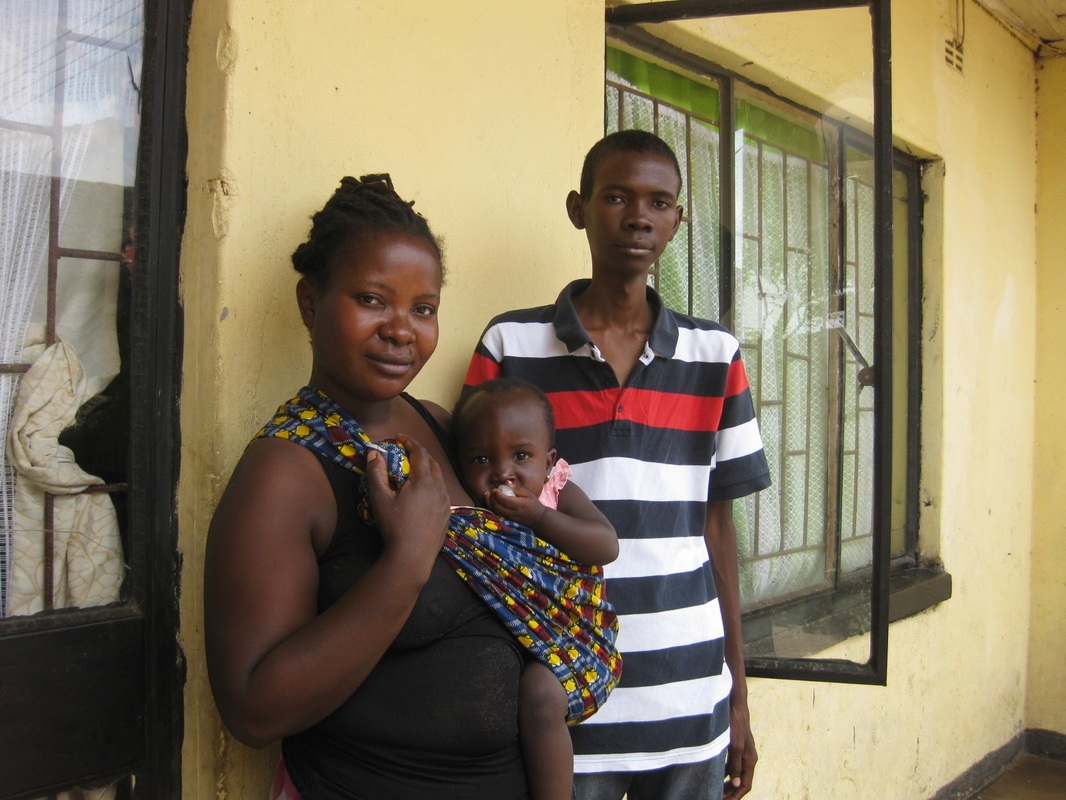
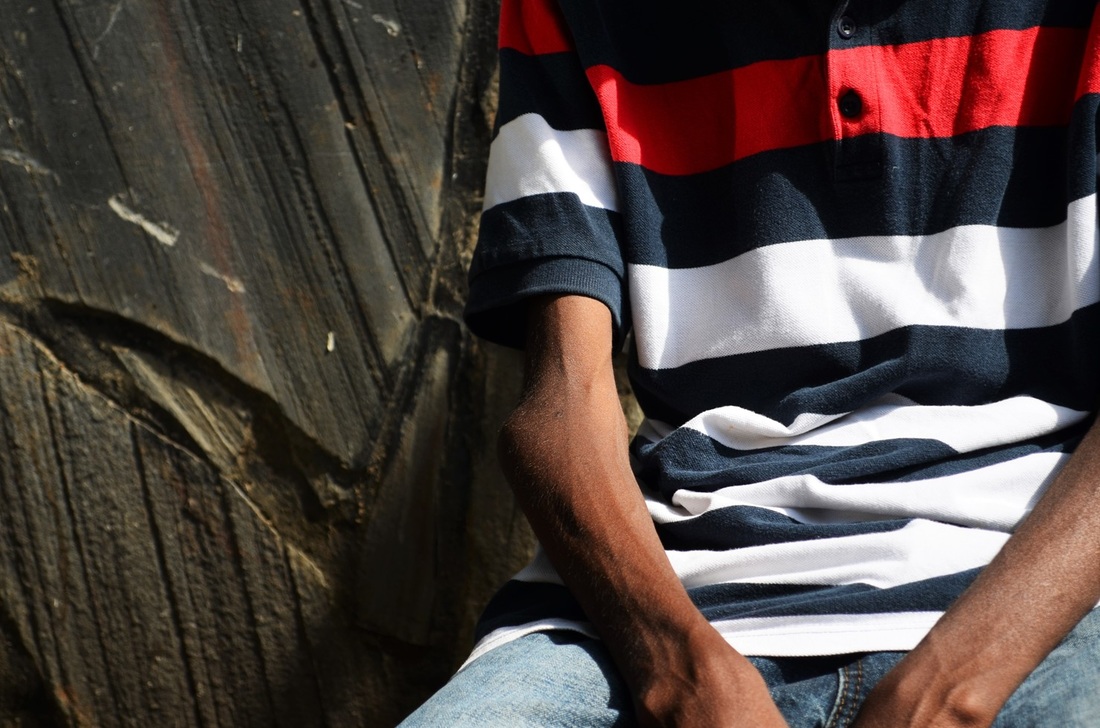
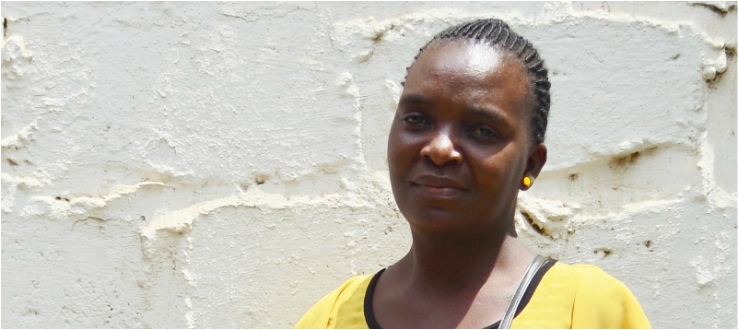
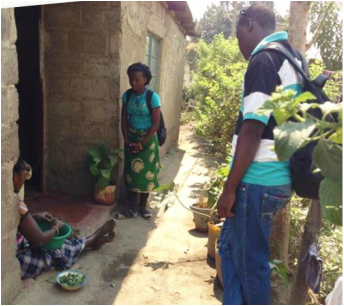
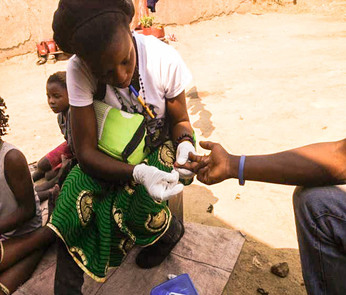
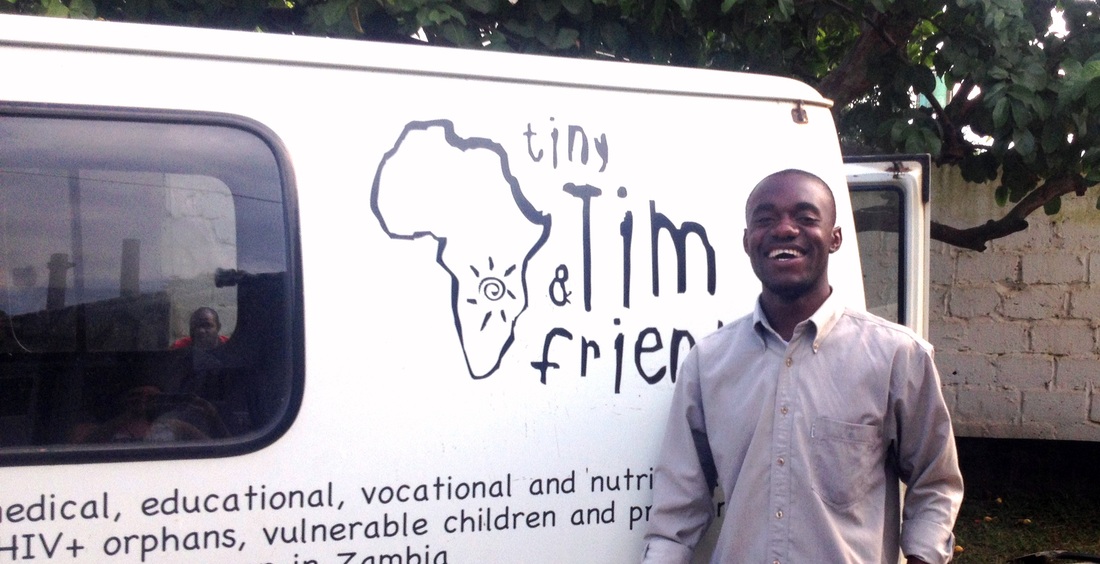
 RSS Feed
RSS Feed